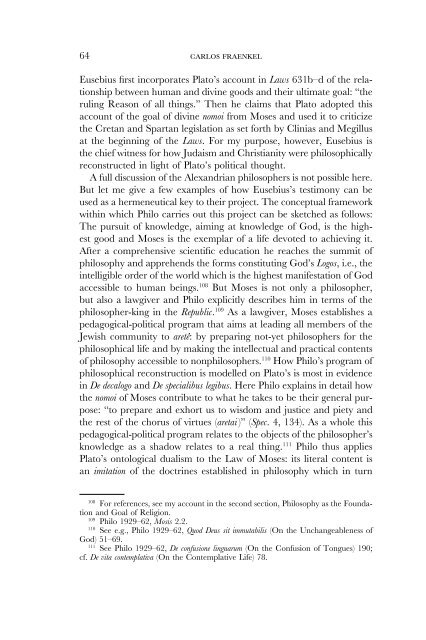Download PDF - Carlos F. Fraenkel
Download PDF - Carlos F. Fraenkel
Download PDF - Carlos F. Fraenkel
You also want an ePaper? Increase the reach of your titles
YUMPU automatically turns print PDFs into web optimized ePapers that Google loves.
64 carlos fraenkelEusebius first incorporates Plato’s account in Laws 631b–d of the relationshipbetween human and divine goods and their ultimate goal: “theruling Reason of all things.” Then he claims that Plato adopted thisaccount of the goal of divine nomoi from Moses and used it to criticizethe Cretan and Spartan legislation as set forth by Clinias and Megillusat the beginning of the Laws. For my purpose, however, Eusebius isthe chief witness for how Judaism and Christianity were philosophicallyreconstructed in light of Plato’s political thought.A full discussion of the Alexandrian philosophers is not possible here.But let me give a few examples of how Eusebius’s testimony can beused as a hermeneutical key to their project. The conceptual frameworkwithin which Philo carries out this project can be sketched as follows:The pursuit of knowledge, aiming at knowledge of God, is the highestgood and Moses is the exemplar of a life devoted to achieving it.After a comprehensive scientific education he reaches the summit ofphilosophy and apprehends the forms constituting God’s Logos, i.e., theintelligible order of the world which is the highest manifestation of Godaccessible to human beings. 108 But Moses is not only a philosopher,but also a lawgiver and Philo explicitly describes him in terms of thephilosopher-king in the Republic. 109 As a lawgiver, Moses establishes apedagogical-political program that aims at leading all members of theJewish community to aretê: by preparing not-yet philosophers for thephilosophical life and by making the intellectual and practical contentsof philosophy accessible to nonphilosophers. 110 How Philo’s program ofphilosophical reconstruction is modelled on Plato’s is most in evidencein De decalogo and De specialibus legibus. Here Philo explains in detail howthe nomoi of Moses contribute to what he takes to be their general purpose:“to prepare and exhort us to wisdom and justice and piety andthe rest of the chorus of virtues (aretai )” (Spec. 4, 134). As a whole thispedagogical-political program relates to the objects of the philosopher’sknowledge as a shadow relates to a real thing. 111 Philo thus appliesPlato’s ontological dualism to the Law of Moses: its literal content isan imitation of the doctrines established in philosophy which in turn108For references, see my account in the second section, Philosophy as the Foundationand Goal of Religion.109Philo 1929–62, Mosis 2.2.110See e.g., Philo 1929–62, Quod Deus sit immutabilis (On the Unchangeableness ofGod) 51–69.111See Philo 1929–62, De confusione linguarum (On the Confusion of Tongues) 190;cf. De vita contemplativa (On the Contemplative Life) 78.



